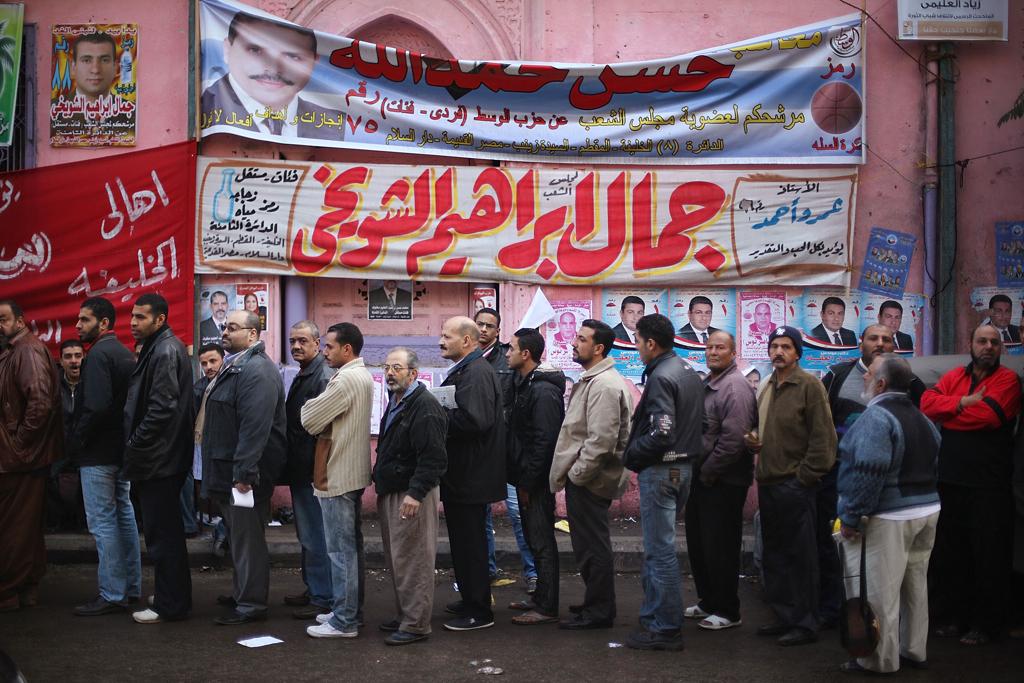Egypt elections: Egyptians line up to vote in landmark polls (VIDEO)
Voters line up outside a polling station on November 28, 2011 in Cairo, Egypt.
Voting began Monday morning in Egypt's first elections since the fall of Hosni Mubarak and his government seven months ago.
Many polling stations already had long lines outside before they officially opened at 8:00 AM local time, the BBC reported. Some queues were said to be up to two miles long.
More from GlobalPost: Egypt votes: A primer
In dowtown Alexandria, GlobalPost's Erin Cunningham said she witnessed "long, long lines. Sometimes two lines for one station around the block."
Campaigning was supposed to be banned at polling stations for the 48 hours prior to voting, but many people appeared to defy the order by handing out leaflets "right outside poll gates," said GlobalPost's Jon Jensen in central Cairo. Most of the accusations centred on the Muslim Brotherhood party, but our correspondent said other parties were also involved.
Delays were reported at other stations, where the late arrival of voting materials and officials held up opening by more than an hour in some cases, said Al Jazeera's correspondent in Cairo.
More from GlobalPost: Egypt's military: From ally to adversary
The Supreme Electoral Commission (SEC) has assured stations that opened later than 8:00 AM will remain open later than the official 7:00 PM closing time to allow voters to cast their ballots, reported local newsite Ahram Online. The head of the SEC, Abdel Moez Ibrahim, blamed the delays on traffic congestion, and said Monday's vote was still "experimental."
Clashes were reported at some polling stations between security forces and voters frustrated at the delays. At midday, military police chief General Hamdy Badeen told state TV that the situation was stable in all nine governorates voting Monday, and that security forces would guard ballots boxes until the second day of voting began Tuesday.
Presidential candidate Amr Moussa, queuing to vote in the capital, told the Associated Press:
"If you ask anybody here, we are all happy, very happy. This is the first step in realizing the goals of the revolution."
More from GlobalPost: Military trials threaten Egypt's democracy
Yet in Tahrir Square, protesters said they were boycotting the election. The crowd was much smaller than in previous days, however, after several of the parties supporting the popular protests urged demonstrators to vote, Ahram reported.
Monday's polls will help decide the make-up of Egypt's People's Assembly, or lower house of parliament.
Voting is scheduled according to region; around a third of Egyptian voters are invited to cast their ballots on November 28, with second and third phases of voting scheduled for December 14 and January 3. Each round of voting will take place over two days.
Egyptians living abroad are also eligible to take part. In the US, Egyptians were given an extra day to vote Monday following complaints from many people that they had not had time to get to their nearest consulate, said Ahram.
More than 6,500 candidates from more than 45 political parties are running.
More from GlobalPost: The roots of Egypt's rage
Every day, reporters and producers at The World are hard at work bringing you human-centered news from across the globe. But we can’t do it without you. We need your support to ensure we can continue this work for another year.
Make a gift today, and you’ll help us unlock a matching gift of $67,000!
